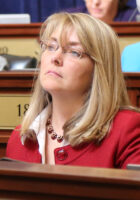The Idaho House quickly and decisively passed all seven major pieces of the public school budget Monday.

It took less than 30 minutes for legislators to pass the state’s largest budget, spending more than $1.5 billion in the process. Taken together, the budgets increase education spending by 6.8 percent over this year’s levels, or about $100 million.
The budgets received a smattering of opposition from conservative Republicans. However, no bill received more than eight dissenting votes in the 70-member House, and no lawmakers debated against any of the bills.
“I was thrilled to get those off the House floor with that much support,” said Rep. Wendy Horman, the Idaho Falls Republican who helped write and carry the budgets.
Two budget highlights include increased teacher pay, through the second year of the career ladder law, and reversing cuts to school districts’ operation budgets.
The budgets increase state funding for teacher pay by $41.5 million and boost per-classroom operational spending to $25,696, the high-water mark reached in 2008-09.
“We’re making a strong statement about the need to compensate our teachers the best we can, and fund our school districts’ operations the best we can,” Horman said. “There is more work to be done, this is only a step, but I think it makes a strong statement of support.”
Horman did not have any doubts Monday that lawmakers would also approve a series of supplemental “trailer” budget bills. The Joint Finance-Appropriations Committee last week earmarked $9.1 million for a literacy initiative designed to support struggling young readers and funding for a school innovation program.
If those bills pass, state general fund spending on education would increase by 7.4 percent from 2015-16, about a $109 million increase. That would mirror the budget increase from 2014-15 to 2015-16.
In past years, lawmakers have sometimes placed public school budgets under close scrutiny. But when the seven budget bills were called shortly before lunch Monday, there was essentially no debate.
House Minority Leader John Rusche debated in favor of the budget bills. But Rusche, D-Lewiston, pointed out that schools still face fiscal challenges — requiring a spate of supplemental levies and the growth of four-day school calendars in rural districts.
Later Monday morning, House members spent nearly as much time debating a charter school governance bill as they did considering the seven budget bills.
“There have been other years where these (budget) bills have taken longer,” Speaker of the House Scott Bedke, R-Oakley, said.
